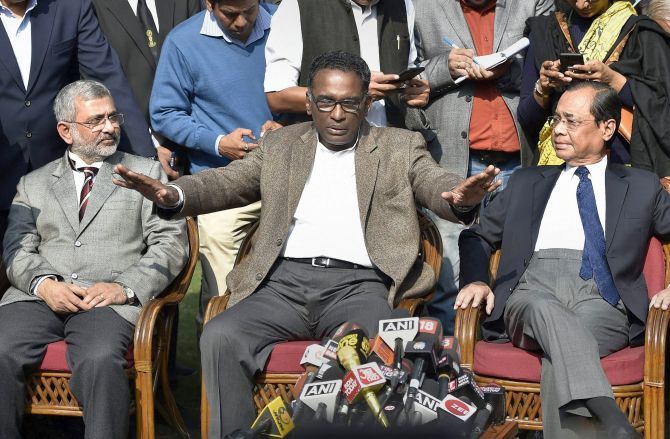
The four Supreme Court judges, in their letter written to the Chief Justice of India, referred the case of R P Luthra vs Union of India, which dealt with the 'memorandum of procedure', to raise questions about the assignment of cases "selectively" to preferred benches without any rationale.
The letter written by four senior-most judges of apex court -- Justices J Chelameswar, Ranjan Gogoi, M B Lokur and Kurian Joseph -- said "when the MoP was the subject matter of a decision of a Constitution Bench of this court, in Supreme Court Advocates-on-record Association and Anr Vs Union of India, it is difficult to understand as to how any other bench could deal with the matter".
On October 27 last year, a two-judge bench of apex court had agreed to examine the issue of delay in finalisation of memorandum of procedure for appointments of judges in higher judiciary on judicial side and had sought the response from the attorney general.
It had said, "We need to consider the prayer that there should be no further delay in finalisation of MoP in larger public interest. Even though no time-limit was fixed by this court for finalisation of the MoP, the issue cannot linger on for indefinite period."
R P Luthra, a lawyer himself, had appeared in-person in the case and challenged the appointments made to the higher judiciary in the absence of MoP, which was to be finalised in the wake of National Judicial Appointments Commission verdict.
The letter, which was written by the four judges two months back to the CJI but released on Friday to the media, also mentioned about the constitution bench verdict in Supreme Court Advocates-on-record Association and Anr Vs Union of India popularly called NJAC case, in which it had asked Centre to frame the new MoP in consultation with the CJI.
Striking a dissent note, Justice J Chelameswar, who was part of the five-judge constitution bench that heard the NJAC case, had said that the collegium system for the appointment of judges was "opaque" and needed "transparency".
He had said in his separate verdict that "primacy of the judiciary" in the appointment of judges was a basic feature of the Constitution and was "empirically flawed."
The R P Luthra case, however, was later listed before a three-judge bench headed by CJI Dipak Misra on November 8 last year, which recalled the October 27 order of two-judge bench on examining the issue of delay in finalisation of MoP.
The three-judge bench had then said that "these issues cannot be taken up on the judicial side as the law has already been settled by the constitution bench in NJAC case".
The four judges in their letter said, "Any issue with regard to MoP should be discussed in the Chief Justices' conference and by the full court. Such a matter of grave importance, if at all required to be taken on the judicial side, should be dealt with by none other than a constitution bench."
It also said that the development must be viewed with "serious concern".
"The hon'ble Chief Justice of India is duty bound to rectify the situation and take appropriate remedial measures after a full discussion with the other members of the collegium and at a later stage, if required, with other hon'ble judges of this court," the letter said.
The four judges have also told the CJI in the letter that "once the issue arising from the order dated October 27, 2017, in RP Luthra Vs UOI, mentioned above, is adequately addressed by you and if it becomes so necessary, we will apprise you specifically of the other judicial orders passed by this court which would require to be similarly dealt with".
Image: Supreme Court judge Jasti Chelameswar along jusctices Ranjan Gogoi and Kurian Joseph during a press conference in New Delhi. Photograph: Ravi Choudhary/PTI Photo











 © 2025
© 2025